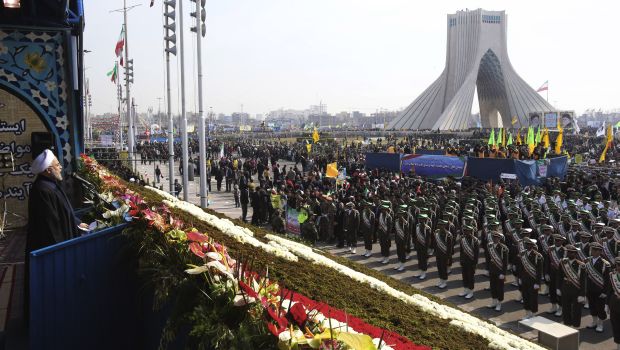
Iranian President Hassan Rouhani, delivers a speech during an annual rally commemorating anniversary of the 1979 Islamic revolution, at the Azadi (Freedom) Square in Tehran, Iran, Tuesday, Feb. 11, 2014. (AP Photo/Vahid Salemi)
Speaking at a rally in Tehran’s Liberty Square, Rouhani denounced both the economic sanctions imposed on Iran by the US and its allies, which he said were “brutal, illegal and wrong,” and claims that Iran had sought the means to build a nuclear bomb.
He said: “We wanted to strip ill-wishers of their scare tactics, we wanted to speak even louder that there is no basis for fearing Iran in the region, that they are all lies . . . We must eradicate the negative image in world public opinion about our revolution.”
But Rouhani also said that Iran would continue to negotiate with the P5+1—the United States, United Kingdom, France, Russia, China and Germany—over Iran’s nuclear program, saying: “Iran is determined to hold fair and constructive talks within the framework of international regulations and we hope to see such an intention on the other side as well.”
The next round of talks between the two sides is scheduled to begin next week in Vienna, and aims to start transforming the interim agreement Iran and the world powers struck last November into a final, comprehensive settlement.
Many members of the crowds in Tehran and elsewhere burned photos of US President Barack Obama and Israeli Prime Minister Benjamin Netanyahu, as well as chanting anti-US slogans, which has been customary at large rallies in Iran since the ousting of the Shah, a major US ally, in 1979.
Rouhani’s policy of reducing tensions with the US and repairing relations with the outside world has been largely well-received in Iran, despite some suspicion from hardliners within the Iranian political system and society at large that his conciliatory approach risks weakening the Islamic Republic.
Iran’s nuclear program has also become a source of national pride among the Iranian public, which Rouhani was careful to address in his speech, criticizing claims from some in the US government that the option of military strikes on Iran’s nuclear facilities remained a possibility if talks failed.
Rouhani said: “If some have the illusion that there is a threat against the Iranian nation on the table, we say they need new eyeglasses . . . There is no military threat against the Iranian nation.”
“I want to expressly announce that the movement of the Iranian nation towards the peaks of scientific and technical progress and advancement, including peaceful nuclear technology, will be forever,” he added.
Recent Iranian announcements that it has deployed warships to the Atlantic close to US maritime borders, and tested two ballistic missiles within Iran, were also aimed at placating hardliners, say analysts, in order to give Rouhani political cover to continue his outreach policy.
Farhang Jahanpour of Oxford University’s Faculty of Oriental Studies told Reuters that the missile test and deployment of warships were “propaganda” for domestic political purposes.
“The message is that ‘we are not surrendering, we are still OK, we are still winning points.’ The idea is to blunt the criticism of those who don’t like the negotiations,” he said.
Rouhani’s foreign minister, Mohammad Javad Zarif, echoed Rouhani’s comments.
He said: “The people’s participation in the 35th anniversary demonstrations encourage us to continue to insist on the rights of these people, and, at the same time, to try to remove all obstacles to constructive interaction with the rest of the world.”
